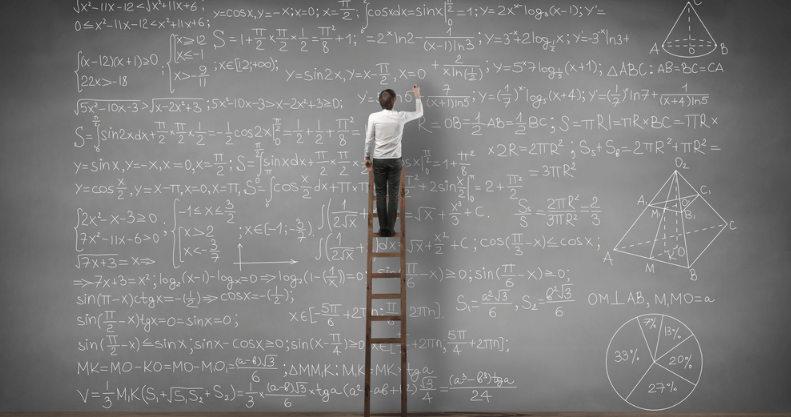According to a study, 82 percent students of classes 7 to 10 are fearful of Math in Indian schools. Only 1 from 10 students are confident about his/her math ability. Working on 1,600 students, the study showed a rising disconnect between students and their learning of mathematics. Less competent Math – doing teachers is the primary source of Math anxiety and fear and weaknesses among students.
That we have plenty of teachers knowing mathematics indicates that this subject has won an important position in our society. The masters degree in the subject is seen as a solid testimony of a teacher’s math knowledge. That, however, is not a reality always. This columnist’s two-decade experience in school teaching attests to the fact that in most cases, the degree holders turn out to be a part of the problem, not of the solution. It may look strange.
Ninety- five percent math teachers carry on with the fixed procedures for solving math problems. This conservative approach costs students ‘ motivation and attractiveness for the subject. Thus, their math learning falls nonstop.
What many Math knowing teachers overlook is that learning is not taught; it is caught. An effective teacher causes students to learn by creating an atmosphere of learning in a classroom. This entails learning by doing on the strength of the readiness from learners. A tonic of motivation is a must for pupils learning maths or any other topic. No hunger for learning suggests all is not well with a teacher’s way of working.
Notably, some math teachers are doing excellently which inspires several students to opt for the subject. These able teachers, in effect, continue to learn themselves. Which gifts them with a matchless style of teaching and raises their level of confidence besides effectiveness. It also earns them name and fame among the students and people at large. A few years ago, this small columnist luckily was in the company of a few great teachers. Include some brilliant math doing ones. All of them were very dear to their students because of their unique way of teaching. I do not think, I have become one such great teacher.
On the other hand, there are several teachers wanting in the required teaching competence. Qualification level aside. Many math teachers believe in strictly following the set procedures of solving mathematical issues. This sometimes finds them depending upon lengthy methods which does more harm than good.
We have certain math teachers who believe in finishing one full chapter or half of it in a single classroom interaction. These “educators” do not show sympathy with the students but just aim at finishing the syllabus as early as possible. Whether any learning occurs in reality or not, such teachers do not bother about that.
It is here the role of the school administration assumes greater importance — the administration can ask these teachers to focus on the challenges and issues a child faces during the journey of life. Since this attitude is missing in most cases, children fall easy victims to the whims of these teachers, the so called task masters.
Under the more -than- necessary classwork and homework of many subjects, student’s back home show signs of depression, frustration, anger and impatience. This murders the learning motivation and attractiveness among them; it also defeats the purpose of schooling. Demotivated students prefer playing or doing something else to attending the class or school for long hours. Students by and large have no stomach for the teaching by the teacher who emphasizes on overloaded class work and homework. But less on quality learning.
For example, some teachers routinely ask their students to prepare a full chapter or half of it for recitation the next day. Or some teachers run through the syllabi, aiming at its quick finish. Only in rare cases, a teacher works at the right pace, keeping every child’s welfare and development in mind.
Similarly, few teachers focus on every child; most of them appreciate and encourage only one or two students in the class. Thus these teachers hurt the feelings and academic progress of other students. Most math teachers top this list. Is every student not special and worthy of encouragement?
A student may not succeed in solving a math question involving the addition/ division operation. Why dub him/her as a slow learner? Or a student cannot memorize or recite some answer. This does not signal that the student is “inefficient “. Judging students in disgusting terms on sheer rote memory is a violation of a learner’s right to dignity. Also against the Right to Education.
In majority of cases, teachers’ answer writing capability is questionable and demands a revisit. Why do several teachers write lengthy and tough worded answers, especially in case of History, Science, Urdu and Kashmiri subjects for school children? B.Ed degree advises against longish answers. So do educationists and psychologists.
Accepted that we have many competent math knowing teachers, but we require math- doing teachers. The latter— although play a key role in teaching maths on the ground level— are in chronically short supply unfortunately. Thus, we see eight out of ten students walking away terrified from the math subject.
Fine is training. It can improve the situation only if imparted through knowledgeable, dedicated, efficient and effective trainers; in fact by the bright teachers at the school level. It is not the obtained but earned B.Ed degree which is essential to cultivate a crop of brilliant math teachers for school teaching. These teachers can be a port in a storm.
(Author is teacher by profession and RK Columnist. Feedback: [email protected])








